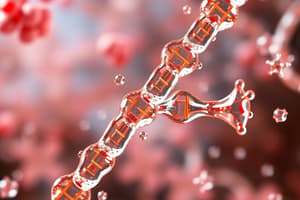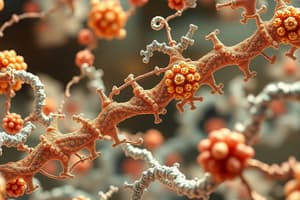Podcast
Questions and Answers
What is the most important part of an enzyme that is responsible for its function?
What is the most important part of an enzyme that is responsible for its function?
- Activator
- Active site (correct)
- Cofactor
- Coenzyme
Which of the following is NOT a characteristic of enzymes?
Which of the following is NOT a characteristic of enzymes?
- Enzymes are consumed during the reaction (correct)
- Enzymes are specific for their substrates
- Enzymes catalyze biochemical reactions
- Enzymes are present in trace amounts in the body
What term refers to a different form of a particular enzyme based on certain properties?
What term refers to a different form of a particular enzyme based on certain properties?
- Isoform (correct)
- Isoenzyme
- Zymogen
- Apoenzyme
Which factor has the greatest influence on the velocity of an enzymatic reaction?
Which factor has the greatest influence on the velocity of an enzymatic reaction?
What term refers to the structurally inactive form of an enzyme?
What term refers to the structurally inactive form of an enzyme?
What is the optimal pH range for most enzymatic reactions?
What is the optimal pH range for most enzymatic reactions?
Where are enzymes found in the body?
Where are enzymes found in the body?
What term refers to the protein portion of an enzyme that is subject to denaturation and loss of activity?
What term refers to the protein portion of an enzyme that is subject to denaturation and loss of activity?
Flashcards are hidden until you start studying
Study Notes
Active Site
- The active site is the most important part of an enzyme, responsible for its specific function. It is a three-dimensional cleft or groove on the enzyme's surface that binds to the substrate and facilitates the chemical reaction.
Enzyme Characteristics
- Enzymes are biological catalysts that increase the rate of chemical reactions without being consumed in the process.
- They are highly specific, meaning they catalyze only a specific type of reaction involving specific substrates.
- Temperature and pH can influence the rate of enzymatic reactions.
- Enzymes are regulated and are subject to feedback mechanisms within the body.
Isozymes
- Isozymes, or isoenzymes, are different forms of an enzyme that catalyze the same reaction but exhibit different physical and chemical properties.
Factors Affecting Velocity
- The concentration of substrate has the greatest influence on the velocity of an enzymatic reaction. As the substrate concentration increases, the rate of reaction also increases until the enzyme becomes saturated with substrate.
Zymogen
- A zymogen, or proenzyme, is the inactive precursor form of an enzyme. It requires a specific activation step, such as cleavage of a peptide bond, to become active.
Optimal pH
- The optimal pH range for most enzymes is between 6 and 8, although some enzymes function under more acidic or alkaline conditions.
Enzyme Location
- Enzymes are essential for a wide range of cellular functions and can be found throughout the body, including:
- Cytoplasm: The fluid inside cells.
- Organelles: Specialized compartments within cells.
- Extracellular matrix: The space outside cells.
Apoenzyme
- The apoenzyme refers to the protein portion of an enzyme. It is responsible for the enzyme's catalytic activity but requires a non-protein component (cofactor) for full function.
- The apoenzyme is susceptible to denaturation, which is a loss of structure and consequently loss of activity, under extreme conditions such as high temperature or pH changes.
Studying That Suits You
Use AI to generate personalized quizzes and flashcards to suit your learning preferences.



